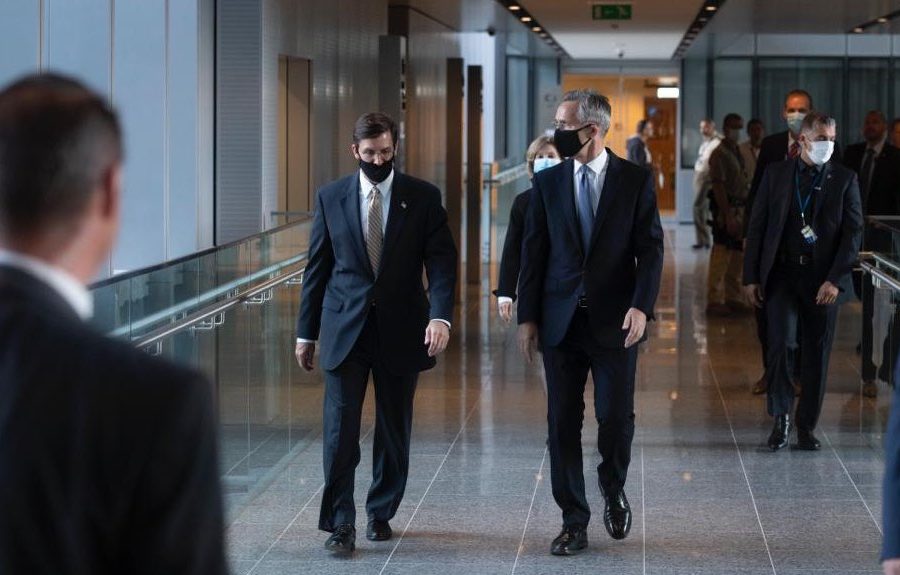President Donald J. Trump on June 30 approved a Defense Department plan to withdraw 9,500 troops from Germany, as a group of bipartisan senators introduced a measure to block the move.
Defense Secretary Mark T. Esper and Chairman of the Joint Chiefs of Staff Gen. Mark A. Milley presented the plan to Trump on June 29, in response to his directive for a reduction because Germany does not spend enough on its defense. The approved plan not only meets Trump’s directive to remove 9,500 troops from Germany, “it will also enhance Russian deterrence, strengthen NATO, reassure allies, improve U.S. strategic flexibility, and U.S. European Command’s operational flexibility, and take care of our service members and their families,” Pentagon spokesman Jonathan Hoffman said in a statement.
Hoffman did not provide any more details on the plan, or how it would accomplish these goals, but said the Pentagon will brief Congressional defense committees soon. U.S. Air Forces in Europe commander Gen. Jeffrey L. Harrigian told reporters June 29 he has not been given any orders to make or plan any changes.
A bipartisan group of senators on June 29 introduced an amendment to the fiscal 2021 defense policy bill to block the move, saying such a step would be a “gift” to Russia.
The measure is supported by Sens. Mitt Romney (R-Utah), Lindsey Graham (R-S.C.), Marco Rubio (R-Fla.), Chris Coons (D-Del.), Tim Kaine (D-Va.), and Jeanne Shaheen (D-N.H.).
Before funds can be freed up for a troop reduction, the amendment calls on Esper to consult with allies and then submit a report to Congress certifying the following:
- A reduction is in the national security interest of the U.S.
- It would not undermine the security of the U.S. and its allies
- It would not undermine NATO’s defense posture
- It would not post “unacceptable risk” to executing contingency plans
- It would not adversely impact operations in the Middle East and Africa
- It would not negatively impact military families
- And, it would not result in new costs for the redeployment and relocation of troops.
“In addition to undermining our NATO alliance, a withdrawal would present serious logistical challenges and prevent our military from performing routine military readiness exercises,” Romney said in a statement.
Earlier this month, Stoltenberg emphasized that the U.S. presence on the continent not only protects Europe, it also enables the U.S. to project power beyond Europe.
“We have seen that bases like the Ramstein Base, the Landstuhl medical facility, and many other U.S. bases in Germany, they are essential for what the U.S. has done over decades in the Middle East, Afghanistan, Iraq, and in Africa,” Stoltenberg said on June 16 prior before the start of the latest defense ministerial meeting in Brussels. “So, it just illustrates that U.S. presence in Europe, yes, it’s of great value for European Allies, but it also matters for the security of the United States.”
Trump, in a White House appearance alongside Polish President Andrzej Duda, said Germany does not meet the NATO goal of spending 2 percent of its gross domestic product on defense, and in turn “we’re going to be reducing Germany very substantially.” Poland does meet that mark, and that country would welcome additional U.S. forces. However, Duda urged the U.S. not to completely pull the troops out of Europe.
NATO Secretary General Jens Stoltenberg, speaking during the recent Brussels Forum, said Trump remains committed to the alliance, and noted that eight of the 30 member countries currently spend 2 percent of gross domestic product on defense. However, he emphasized that European allies have invested $130 billion more than originally planned since 2016, according to a DOD release.
The move to drawdown forces in Germany has drawn condemnation on Capitol Hill, including two rounds of letters from GOP representatives urging against it.
Rep. Adam Smith (D-Wash.), the chairman of the House Armed Services Committee, told reporters June 30 the announcement was “unilateral” from Trump, with the Pentagon then coming in to “backfill the plan.” While the White House has said there would be a reposition to Poland, there is not yet a specific plan.
“It is possible that there is a scenario where repositioning troops out of Germany is in our national security interests,” Smith said. “The President has not made that case to date. The DOD has not made that case, and … the President is doing it in a very haphazard manner. So until we get clear answers as to exactly what the plan is and how it supports our national security strategy, yeah, I think it would be appropriate to say, give us those answers before you move forward.”
There are about 9,377 Active-duty troops at Ramstein Air Base, with another 4,000 at Spangdahlem Air Base. The Pentagon announcement did not provide specific timelines or destinations for the 9,500 forces, but said it “will be providing timely updates to potentially affected personnel, their families, and communities as planning progresses.”
